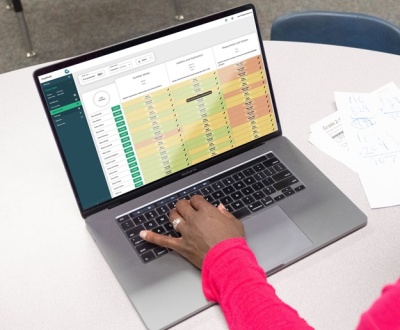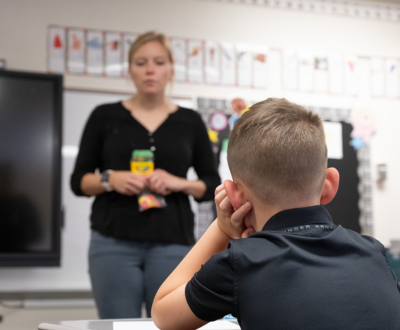Unlock the Power of Your DIBELS Results
- January 9, 2025
- Blog

The Dynamic Indicators of Basic Early Literacy Skills (DIBELS) is a series of short assessments designed to give educators clear insights into students' foundational reading skills. Spanning kindergarten through eighth grade, DIBELS measures essential components of literacy, like phonemic awareness, fluency, and comprehension. With its quick and standardized format, it helps teachers identify which students may need additional support to build strong reading foundations.
Each DIBELS measure focuses on a specific aspect of reading development. For instance, Letter Naming Fluency (LNF) looks at how quickly students can identify and name letters, while Phonemic Segmentation Fluency (PSF) tests their ability to break words into sounds. Other tools, like Nonsense Word Fluency (NWF) and Oral Reading Fluency (ORF), assess skills like decoding and reading speed. Together, these assessments paint a detailed picture of where students are thriving and where they might need extra attention.
DIBELS isn’t just about identifying areas of need—it’s also a tool for tracking growth and refining instruction. By regularly assessing progress, educators can see which strategies are working and make timely adjustments to support students. Whether setting goals for the year or fine-tuning interventions, DIBELS provides a clear, data-driven path to help students succeed as readers.
About one fifth of our current clients use DIBELS 8 to identify areas of need, track growth, and refine instruction. In this article, we break down how Forefront can be used for analysis of student needs, goal-setting, and informing interventions.
Skills Based Focus to Identify Needs & Monitor Growth
Teachers often start analyzing results from the spreadsheet view of the data collection page. Results in this view and be easily sorted by category to identify need-to-fill gaps and student groupings. Read more about collecting results in this view.
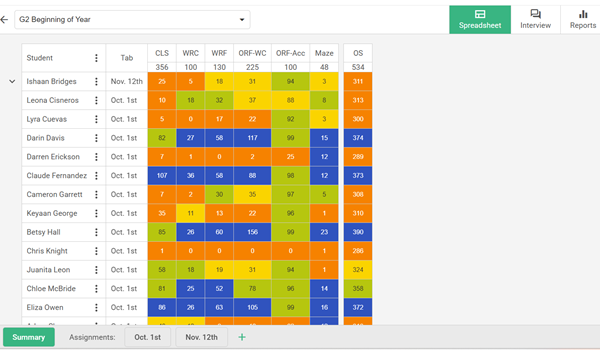
After an initial review, teachers and interventionists can view results via the reporting suite. The reporting suite allows teachers and leaders to look at results through a variety of different report types. Highlights for a DIBELS data dive include:
Analyzing results in a class-level data table as indicated in the image below.

Monitoring growth on a single skill, such as correct letter sounds on the nonsense word fluency, with the Sankey chart.
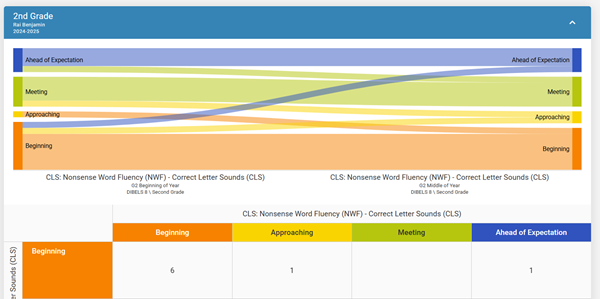
Monitor performance and growth across assessment systems, including those in your literacy or phonics instructional programs. In the example below, we isolate the correct letter sounds skill measure across DIBELS 8 and the first instructional unit for Fundations.
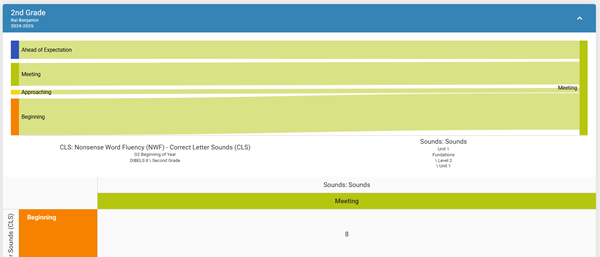
New to Forefront's reporting suite and looking to learn more? Explore our three-part webinar series on looking at assessment data: Intro to Reports, Getting Deeper with Forefront Reports, and Advanced Reporting.
Progress Monitoring with DIBELS
DIBELS progress monitoring helps educators track students' growth and adjust instruction to meet their needs. How often you monitor depends on the skill and the intensity of support. Foundational skills, like phonemic awareness and decoding, should be checked more frequently, while tools like the Maze comprehension measure work best with occasional monitoring—no more than once or twice between benchmarks. Letter Naming Fluency (LNF), however, isn’t recommended for tracking progress, as it isn't a foundational reading skill in the way other DIBELS measures are.
The most reliable measures for progress monitoring are Nonsense Word Fluency (NWF) and Oral Reading Fluency (ORF). These assessments are especially effective at showing growth in decoding and reading fluency. By focusing on the right measures at the right intervals, educators can ensure students receive timely, targeted support, keeping them on track toward their literacy goals.
Forefront can make progress monitoring easy and straightforward. Learn more in this support article.
From DIBELS Data to Action
The Next Steps for DIBELS documents help teachers use data to drive student growth and refine instruction. Forefront organizes assessment results to make it easy to see where students need support, allowing you to quickly align instructional strategies with the specific skills highlighted by the data. For instance, if a student struggles with phonemic awareness, Forefront helps teachers identify this gap and guides them toward targeted activities to address it. This approach ensures instruction stays responsive and focused on student needs.
Sample Next Steps for DIBELS Resource
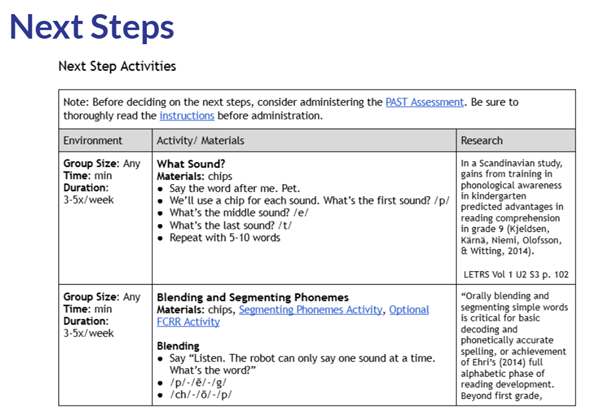
If you are currently a Forefront client, learn how to access these instructional resources in your account. Looking to explore this feature future? Reach out to our sales team today for a sample document or to request a demonstration for your leadership team.
Continue the Learning
Using DIBELS effectively is about more than collecting data—it is about turning that data into meaningful action that supports student growth. With Forefront, educators can simplify the process, making it easier to identify needs, track progress, and refine instruction. Whether you are already using Forefront or just exploring its capabilities, leveraging its features can help you stay focused on what matters most: ensuring every student builds a strong foundation in literacy.
Want to learn more about using DIBELS data to inform instruction? Join us for our upcoming webinar next Tuesday, where we’ll dive deeper into best practices for analysis, progress monitoring, and implementing next steps. Register now!
About us and this blog
Our team and tools help schools implement standards-based grading, streamline assessment systems, and use meaningful data to drive decision-making.
Unlock the Power of Your DIBELS Results
Learn how to make the most of your DIBELS results in this 45-minute on-demand webinar. Led by Forefront’s Client Success Team, identify each DIBELS assessment category, understand research-backed strategies to support student growth, and access next steps aligned with the science of reading. Register below to view the webinar on-demand.
More from our blog
See all postsForefront is the only assessment data solution optimized for classroom assessment results, leveraging these results to fuel instruction, PLCs, and grading. Elevate meaningful assessment data district-wide to transform how you understand and communicate about student learning across your schools.
Copyright © 2025 Forefront Education, Inc. All Rights Reserved.





